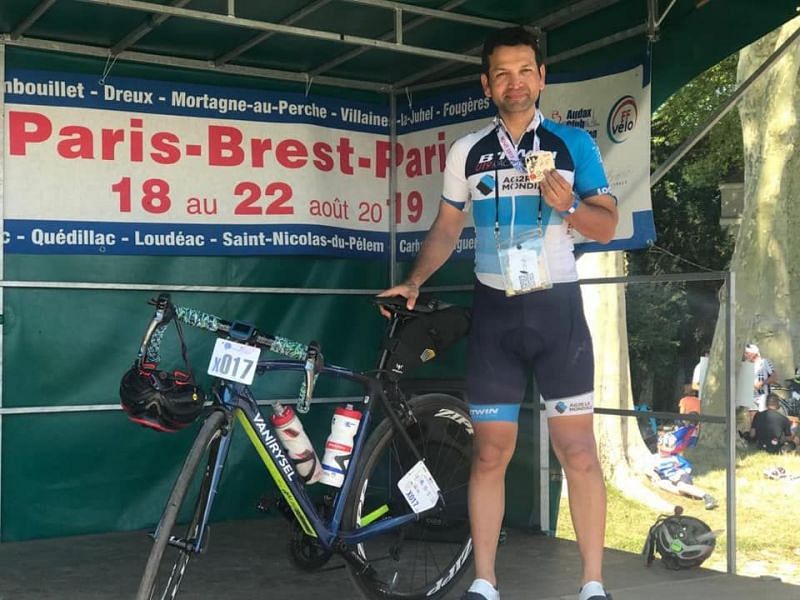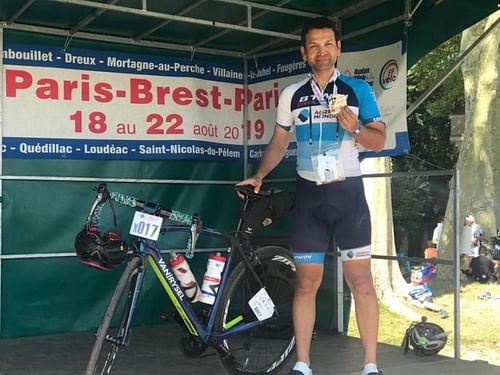
From IT executive to PBP finisher, meet the new cycling champion Sanjeev Sharma

India is a country obsessed with cricket. However, over the years, sports like badminton, wrestling and cycling are getting some much-needed attention. There are cyclists who, despite being less known across India, have achieved milestones that can inspire an entire generation.
One such cyclist is Ghaziabad’s Sanjeev Sharma, who recently completed the coveted Paris-Brest-Paris (PBP) ride, a 1,200 km route from Paris to Brest in Brittany on France’s Atlantic coast, and back to Paris in 81 hours, 22 minutes and 20 seconds at the speed of 14.93 kph.
The history, prestige, and challenge of PBP attract riders from around the world, and the fact that it is only held every four years merely adds to the sense of occasion. This year, over 6000 riders attempted to complete this historic long-distance ride. But for a lot of them, completing the course continued to be a dream.
I caught up with Sanjeev Sharma (SS) to track his journey, the odds he has faced till date and what it takes to complete PBP. Excerpts below -
Q: Tell us a bit about yourself and how did your cycling journey begin?
I trace my roots all the way back to Uttarakhand. I was born and brought-up in Modi Nagar in Uttar Pradesh and last month, I turned 43. After schooling, I was into powerlifting for a year and during that time, I damaged my lower disk (L5-S1). This meant that I had to give up all forms of exercising.
I started my professional career in 2000 in the IT service support sector and got married in 2003 and we are blessed with a 13-year-old boy. In September 2016, I faced lots of pain in my lower back and after an MRI, I was diagnosed with a major issue between L4-L5 and L5-S1.
The pain was such that I was unable to move without support for two weeks. Most doctors recommended surgery as the only option, but one doctor advised me to reduce my weight by 10-15 kg to avoid surgery.
I explored dieting as an option, but the results were not showing as I was unable to hit the gym or take up running due to my back problem. I tried swimming, but the facilities were not good in Ghaziabad and I was forced to leave it. Lastly, I identified cycling as an option and as luck would have it, it worked. I started cycling in October 2017 and as they say, the rest is history.
Q: What inspired you to become a PBP finisher? What ultimately led you to the decision to make a lifestyle change?
In India, I had covered 11,000 km through cycling which included SR in 6 days, 1200 km and 1400 km BRMs through Audax India. During these rides, also known as brevets, I heard about Paris-Brest-Paris (PBP). I learnt from fellow riders and previous participants that the elevation of 12,000 meters makes it one of the toughest cycling events.
If the elevation was not challenging enough, I further challenged myself by opting for the 84-hour category instead of the standard 90 hours and started my training accordingly. My daily routine changed from early January. I hit the roads between 4.00 AM to 4.30 AM and returned by 7:30 AM so that I could leave for office on time.
I'm happy about the fact that I'm the only Indian who completed the PBP in the 84-hour category.
Q: Tell us a bit about the training required before such a big event? How did your body respond to the training?
My first challenge was to find the right trainer and coach to help me improve my cycling pace and strengthen my endurance. As it was not possible to take a long leave and practice on hilly terrain, I started focusing on the above points.
My search ended when I contacted Mr Arvind Panwar, who is a national cycling champion and asked him to become my coach. Initially, Arvind was reluctant in coaching me as I was using an MTB rather than a road bike, but after going through my achievements in endurance rides, he agreed to train me for races which also solved my purpose of PBP preparation.
It was a bit difficult for me to follow the training schedule as most of it was designed for road bikes. I was making sure to complete each training plan with the same intensity and efforts which were required. After a few months, I realized that I was accustomed to these training plans and it helped me win podiums in races, including two podiums where I competed with road bikers on my MTB.
Q: How did you juggle your full-time job, your social life, and your training when you prepared for the PBP? How did you manage your time?
Currently, I’m working with an IT services support company, Sysnet Global, as an assistant general manager. It’s a high-pressure, customer-centric job and I would like to acknowledge the support and encouragement that I received from my reporting manager, my team and the management which allowed me to participate in such events. They celebrated every podium finish and achievement of mine.
I know that it's really important to give time to your family and friends, especially during weekends but once they found out that I'm living my cycling passion, they also started supporting me and also realized that my health and fitness levels had improved drastically.
Q: What was the one constant motivation factor that kept you on track in your training?
A lot of things kept me motivated during the entire training which helped me reduce around 20 kg. The need to remain healthy and fit continues to be the biggest motivation for me and now training has become part of my daily routine.
Q: If you were to do it all over again, would you do anything differently?
Yes, in this PBP event, I spent a lot of time at control points, around 24.3 hours on 13 control points which I feel I could have managed in under 12 hrs. So if I participate in the event in 2023, I will make sure I save more time at control points.
Q: What did your PBP experience teach you and how have you applied that to your daily life?
You always learn from your failure as well as from your success, so for me, PBP taught me more about time management which will be a great lesson in real life also.